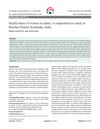natural substance from Neem tree with medicinal and pesticidal properties
a topical anti-androgen with less systemic involvement
a synthetic anti-androgen and weak progestogen that inhibits DHT binding to androgen receptor
a potent but unapproved and potentially problematic topical anti-androgen




